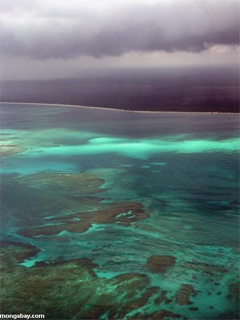Tropical ocean dead zones could increase 50 percent by 2050
Jeremy Hance, mongabay.com
November 18, 2008
|
|
If carbon dioxide levels continue to rise as expected, marine dead zones in the tropics are expected to increase by 50 percent in just over four decades, according to a new study from the Leibniz Institute of Marine Sciences in Germany. The expansion of marine dead zones in tropical seas could have devastating impacts on ocean ecosystems and fisheries.
Hundreds of meters below the surface tropical oceans contain low amounts of oxygen, resulting in what scientists call ‘dead zones’ due to the inability of most marine life to survive in the area. Many such zones are created by humans dumping chemical nutrients into the water, such as the massive dead zone in the Gulf of Mexico, but these deep-water dead zones in the tropics are natural, though augmented by climate change.
|
|
Employing a worldwide model of climate, ocean circulation and biogeochemical cycling, the research team found that middle and high latitudes—i.e. temperate seas—should see little change in dead zones from climate change. Tropical oceans were not so lucky. The researchers found that dead zones in the tropics will rapidly increase, rising vertically toward the surface. With more carbon dioxide in the water, algae populations will skyrocket and so will ocean bacteria. The bacteria feed on the algae and in the process take oxygen from the water.
"Carbon dioxide fertilizes biological production," Andreas Oschlies told Nature.com. "It's really like junk food for plants. When the carbon-fattened excess biomass sinks it gets decomposed by bacteria which first consume the oxygen, and then the nutrients."
As the dead zones rise vertically in tropic seas, many species will be threatened. According to Oschlies, most fish currently avoid the dead zones by swimming closer to the surface, but with a 50 percent increase in oxygen-depleted waters, fish stocks are likely to become imperiled.
Lothar Stramma, Gregory C. Johnson, Janet Sprintall, Volker Mohrholz. Expanding Oxygen-Minimum Zones in the Tropical Oceans. Science May 2, 2008.
